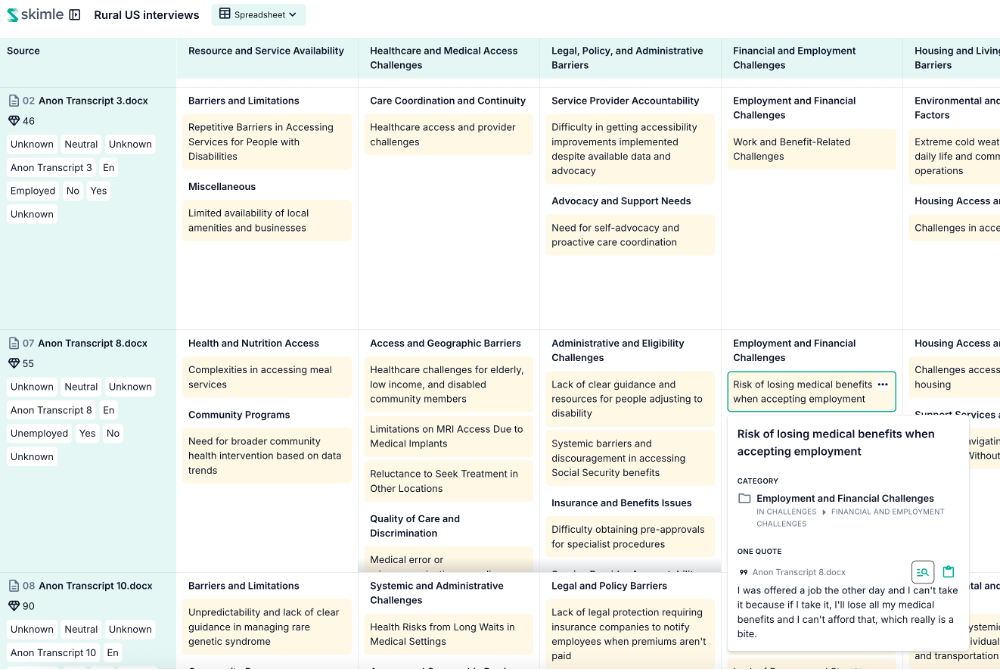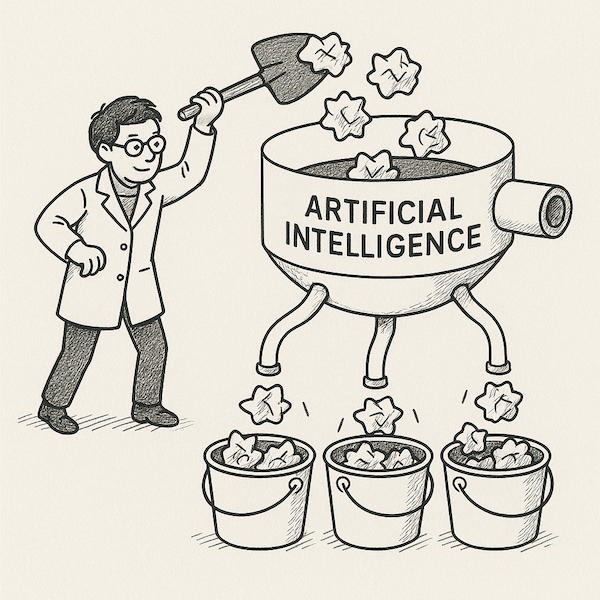Interviews are full of knowledge, but analysis takes effort
Diverse professionals and social scientists use interviews to create insights and synthesize knowledge. While booking and conducting interviews requires time, a proper analysis of resulting data takes significant time, sometimes weeks or months of work. Poor analysis conducted in a hurry is disrespectful towards the informants and squanders the wisdom they have shared.
Depending on the task at hand and the form of interviews, their purpose ranges from mere gathering of information to deeper understandings of informants' thought processes. Whether social scientists shedding light on new phenomena, marketing professionals probing perceptions and emotions related to competing brands, or consultants conducting due diligence, interviews can turn the subjective viewpoints of individual informants into a broader intersubjective understanding of a field.
Growing sample sizes
While qualitative research does not rely on statistical significance, more data often means richer insights and greater confidence in findings. In social sciences, the number of interviews conducted for a single study has crept up over the years, from a dozen to several dozen, and then to more than fifty. Now the leading journals in the field of management commonly feature studies with close to or even over a hundred interviews.
There are many benefits from collecting more interviews:
- Capture diverse perspectives: Different viewpoints and even contradictory opinions emerge depending on organizational position, seniority, and personal background
- Refine your interview protocol: Knowledge created by interviews greatly depends on the questions posed by the interviewer, and asking the right questions often requires first asking some wrong ones
- Discover minority insights: Some vital information and interesting perspectives are held only by a minority of informants; larger samples increase the likelihood of capturing these rare but valuable viewpoints
- Build confidence in findings: Larger samples provide researchers with confidence to make knowledge claims and give practitioners the assurance needed to take decisive actions
Keeping track of the contents of these interviews is cumbersome. In practice even experienced researchers often focus on a handful of "star informants", while assuming most interviews to be only partially relevant.
AI to the rescue
Skimle excels at the analysis of interviews by providing users with a comprehensive account of interview contents, organized in categories and subcategories. The platform is calibrated towards inclusiveness, picking up all the content from all interviews related to desired "insight types". These can include information stated by the informants, such as:
- Evaluations of products or companies
- Problems or risks
- Major events
Alternatively, Skimle can extract more evaluative and subjective content:
- Explicit or implicit emotions towards a product or company
- Interpersonal conflict
- Sources of motivation
The service lays out the key insights in a spreadsheet-like interface, with each interview represented by a row, and the thematic categories by columns. With AI-generated metadata, it is possible to ask chat interface to surface contents based on interviewee characteristics, such as gender or organizational role.

Although not all information is relevant for the user, the initial categorization allows users to zoom into what matters. It is useful to think of Skimle as a kind of a sieve that takes the contents from the interviews and places them in thematic "buckets" of varying relevance to the analyst. Importantly, no insights are lost: everything is placed in a category. The service leverages large language models through a complex iterative workflow that creates a comprehensive analysis of your data, while maintaining transparent linkages to key quotes and their context in the interviews.

While this initial categorization is useful, the ability of the user to copy or move insights into alternative categories unlocks a collaborative relationship between the analyst and the AI.
 Example of Skimle's categorization interface displaying interview insights organized by themes
Example of Skimle's categorization interface displaying interview insights organized by themes
Multiple uses of Skimle
Depending on the goals of the interviews, Skimle can provide a broad range of benefits.
Speed up your analysis: When the interviews are conducted to gather information, Skimle speeds up the analysis by extracting the desired insights, organizing them into a logical scheme, and providing ready reports in Word format. The support for Excel and PowerPoint export is coming later this year.
Enrich and challenge understandings: If the purpose of interviews is to develop deeper understandings of subjective viewpoints, social processes, or organizational dynamics, Skimle can help the researcher test and enrich their emerging understandings. For example, if organizational change seems to be hampered by interpersonal relationships, the researcher can quickly form custom categories to capture interpersonal animosity, political conflicts, and negative evaluations of individuals and subgroups. Instant AI analysis does not only surface relevant interviews and quotes but also encourages intellectual curiosity and exploration.
Improve interviewing: One of the less obvious uses of Skimle is to help revise interview questions during the data collection. With tight schedules and long days in the field, it can be difficult for professionals and researchers to reflect on the interviews they have conducted and to adapt their interview "protocols". Skimle can form an instant thematic analysis of the initial interviews, providing valuable insights on the emerging themes across the interviews and highlight key differences across informants. Such a "quick and dirty" analysis can help adjust the focus of interviewing, thus leading to richer insights.